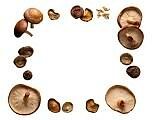
By WHFoods
Long a symbol of longevity in Asia because of their health-promoting properties, shiitake mushrooms have been used medicinally by the Chinese for more than 6,000 years. More recently, their rich, smoky flavor has endeared them to American taste buds. These exotic hearty mushrooms can now be found in supermarket shelves across the U.S. throughout the year.
Like other mushrooms, these specialty mushrooms are as mysteriously unique as they are delicious. While often thought of as a vegetable and prepared like one, mushrooms are actually a fungus, a special type of living organism that has no roots, leaves, flowers or seeds.
What's New and Beneficial about Shiitake Mushrooms
- Although immune system support has often received much of the spotlight in shiitake mushroom research, recent study results involving support of the cardiovascular system have caught the attention of many researchers. In particular, recent studies have shown the ability of shiitake mushrooms to help protect us against cardiovascular diseases (including atherosclerosis) by preventing too much immune cell binding to the lining of our blood vessels. In order for immune cells and other materials to bind onto our blood vessel linings, certain protein molecules - called adhesion molecules - must be produced and sent into action. By helping to block the adhesion molecule production process, substances in shiitake mushrooms can help protect our blood vessels. (The adhesion molecule production that is partially blocked by shiitake mushroom components includes the adhesion molecules ICAM-1, VCAM-1, and E-selectin.)
- Shiitake mushrooms have long been recognized as a very good, non-animal food source of iron. But a recent preliminary study has determined that the bioavailability of iron from shiitake mushrooms may be even better than we thought. Although conducted on laboratory animals (female rats) rather than humans, this study found the iron in dried shiitake mushroom to be equally as bioavailable as supplemental iron in the form of ferrous gluconate. (Ferrous gluconate is a very commonly used low-dose iron supplement.) While we don't usually spotlight research on laboratory animals, we found this result to be especially promising for individuals who consume little or no animal products and are often looking for foods that can supply valuable amounts of bioavailable iron.
- Shiitake mushrooms can be one of the most sustainable foods in your diet! While the majority of shiitake mushrooms produced worldwide have been grown on sawdust block in a non-natural setting, it is fully possible for shiitake mushrooms to be produced on natural hardwood logs in a forest setting. This approach to shiitake mushroom production is called "forest farming" and it has become an especially popular way of growing shiitake mushrooms in the U.S, where there are now more than 200 shiitake mushroom growers. Unfortunately, forest farming is not a requirement for organic certification of shiitake mushrooms. However, all of the plant crop standards in the National Organics Program regulations apply to shiitake mushroom production, and so the combination of these two features - certified organic shiitake mushrooms that have also been forest farmed - can make a great food choice in terms of sustainable agriculture. Just look for the USDA's organic logo on your shiitake mushrooms to determine if they are certified organic. Then check for information about forest farming on the packaging. If no information is provided, there is a good chance that your shiitake mushrooms were not forest farmed. For this reason, we encourage you to ask your store staff or contact the product manufacturer to determine if your shiitake mushrooms were grown on hardwood logs in a natural forest environment.



0 comments:
Post a Comment